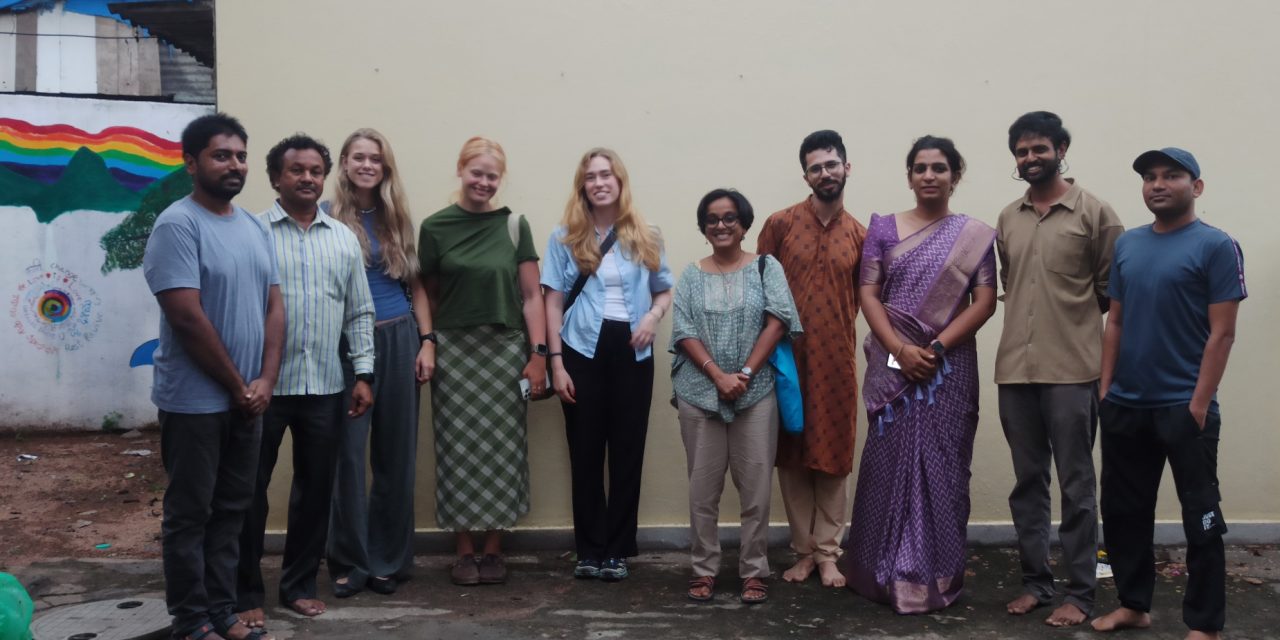The Office for International Affairs (OIA) at the University of Hyderabad (UoH), in conjunction with the Nordic Centre in India (NCI), conducted the SIP (Study in India Program) 2025 Summer Course titled “Gender and Society in Contemporary India.” The NCI has been a partner of the SIP at UoH since 2001 with students coming from different universities in the Nordic region. https://nordiccentreindia.com/
The program commenced on July 14th with a formal welcome to the participating students. Professor Bramanandam Manavathi, Director of the Office of International Affairs, Professor Arvind Susarla, Associate Director and a representative from the Nordic Centre in India (NCI), Dr. Ilika K. Jimo, formally gave the students an orientation to the University and the OIA. The course co-coordinator Professor Anurekha Chari-Wagh also joined in welcoming the students. The orientation concluded with a guided tour of the University campus.
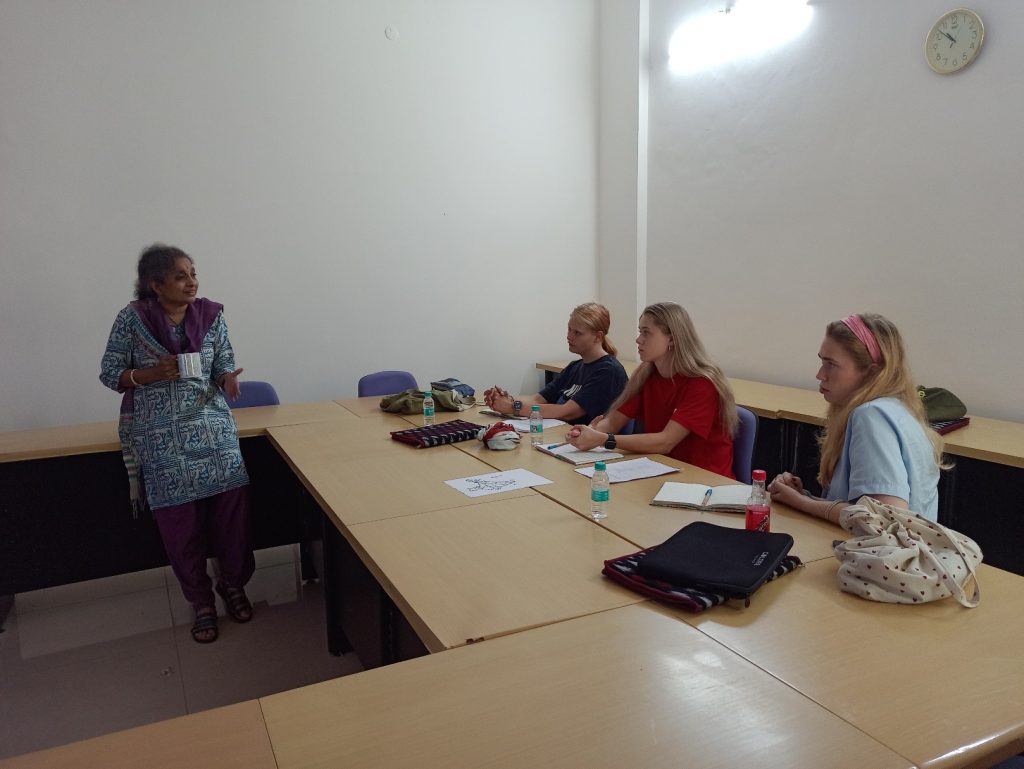
The course started formally on July 15th with an academic orientation conducted by the course co-coordinators, Professor Aparna Rayaprol and Professor Anurekha Chari-Wagh. This marked the beginning of an interdisciplinary academic experience focused on issues related to gender within the Indian context.
This year, the OIA together with the NCI are proud to have revived the program after a gap of more than two years (as the program was last conducted in 2022). As part of the SIP Summer Course, 2025 the University hosted Danish students from diverse disciplinary backgrounds including medical students from Aarhus University, and Psychology students from the University of Copenhagen.
Keeping in mind the students’ disciplinary backgrounds, the OIA and the Course Co-ordinators worked together to ensure the course was refined to advance their interests through an emphasis on the intersecting themes of gender, health and mental health in the Indian context. Further, the course was conceptualized to expose the students to recent research findings across topics related to gender in contemporary in India. The curriculum blended pedagogic tools designed to elicit student participation and active learning. These tools included lectures by distinguished faculty at the cutting edge of research in their respective fields, interactive sessions hosted by the faculty and course co-ordinators and creative assignments. These were complemented by visits to select field sites through which the students were exposed to the nuances of implementing gender related initiatives.
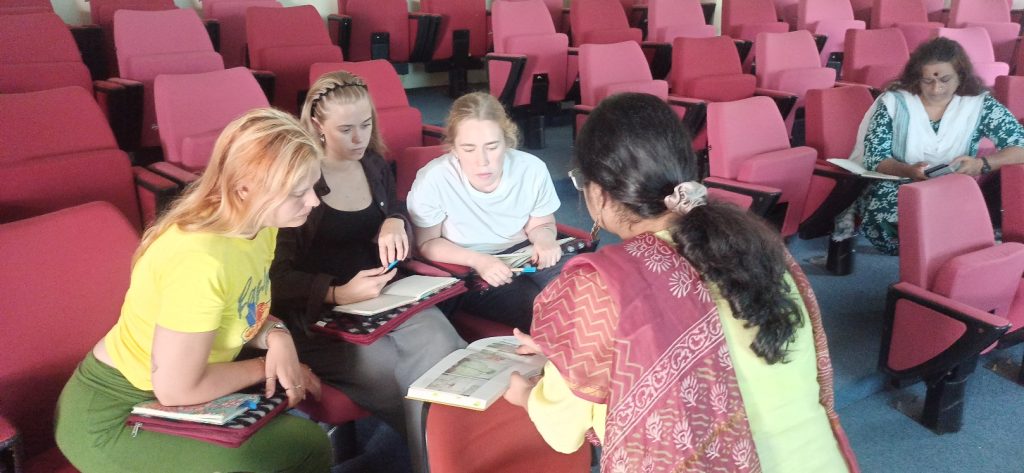
The course content engaged also with several Sustainable Development Goals (SDGs) including SDG 5: Gender Equality; SDG 4: Quality Education; SDG 10: Reduced Inequalities and SDG 16: Peace, Justice and Strong Institutions.
The students received a comprehensive overview of the women’s movement in India provided by Professor Aparna Rayaprol, highlighting key themes that the course as a whole would engage with.
Dr. Asima Jena, Professor Sheela Prasad and Professor B. R. Shamanna addressed issues related to gender, health and community health in contemporary India. Dr. Sneha Banerjee’s session on the politics of reproduction also focused thematically on issues related to reproductive health while using gender as a critical lens through which to view national policy related to these issues.
The course similarly focused thematically on issues related to mental health with Dr. Hymavathi B. speaking on the theme of students’ mental health in higher educational institutions and Professor Vindya Undurti sharing her expertise and cutting-edge research findings on gender and mental health in India.
The course also introduced a range of topics central to the understanding of gender in India, providing students with exposure to the key themes and nuanced ways of understanding gender in contemporary India, grounded in extensive research. Professor G. Nagaraju shared his expertise on gender and education; Professor Anurekha Chari-Wagh discussed cutting-edge policy issues related to gender and development; Professor Aparna Rayaprol shared her expertise on feminist epistemology and on gender and diaspora; Professor Sheela Prasad shared insights from her research on gender and environment and Dr. Gitanjali Joshua facilitated a discussion on the intersections between gender, law and religion in India’s postcolonial context. Gender in contemporary media was discussed by Professor Kanchan Malik and Professor Deepa Srinivas who focused on masculinity in Indian Cinema. Professor Suneetha Rani shared her breadth of knowledge on gender, caste and writing in India. Dr. Asima Jena introduces the students to issues surrounding gender and work in contemporary India while Dr. Hoinheilhing Sitlhou dealt with the harsh realities of gendered violence in conflict zones. Professor Pushpesh Kumar shared his vast expertise on issues relating to sexuality in contemporary India. The students also visited a typical University classroom, to attend a lecture on gender and space/feminist pedagogy by Professor Anurekha Chari-Wagh. These sessions were complemented by film screenings and interactive discussions, further enriching the students’ learning experience. Further, Dr. Sarita Devi conducted a dedicated Yoga session to introduce the students to Yoga blending both theory and practice.
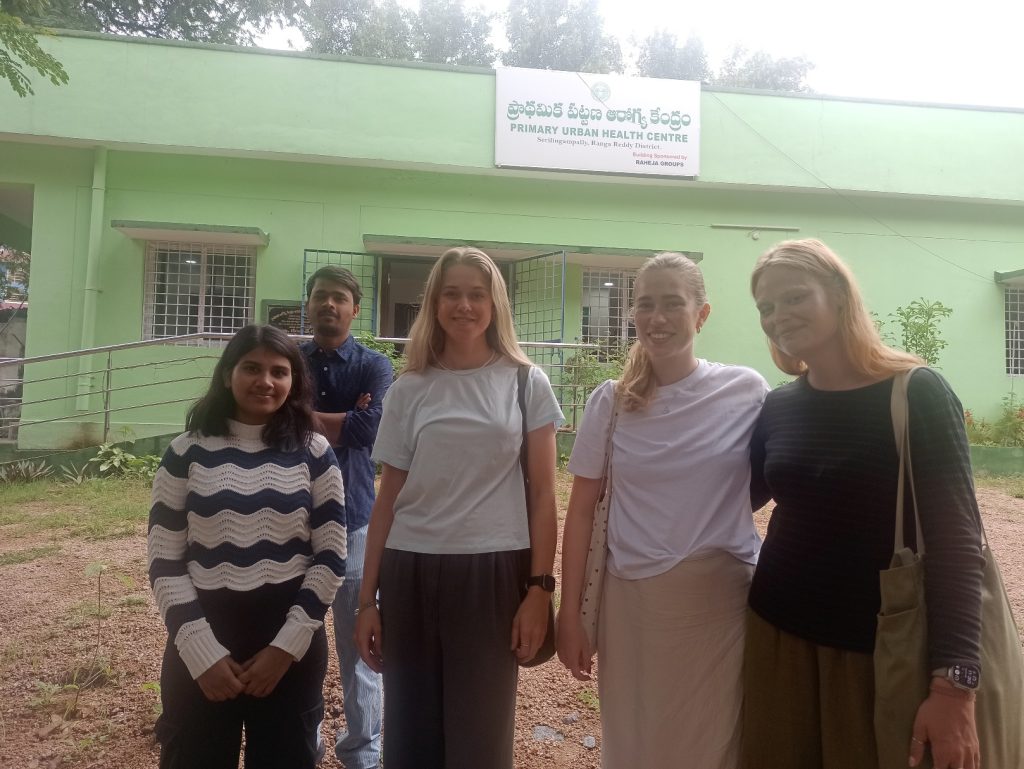
Complementing this exposure to contemporary academic research on gender through lectures, interactive discussions and classroom activities, students also participated in several field visits aimed at enhancing practical understanding of gender issues. They visited the NGO, Yugantar where they were provided with an orientation on the NGO’s gender-focused work, specifically their on ‘Budget Rani’, a project where they work with financial and digital literacy for domestic workers and their earlier work on masculinity, providing training through cognitive behavioural therapy for ‘Rowdy Sheeters’ with the aim of challenging criminalization of minority youth.
Students also visited the Queer-Trans Wellness and Support Center, which offers critical resources and support for LGBTQIA+ individuals. They were briefed on issues relating to queerness and gender in India and oriented to the work the QT center performs including providing mental health support in partnership with Pause for Perspective, legal aid, crisis response initiatives, and temporary shelter mechanisms. Students also attended events organized and facilitated by Pause for Perspective, holding space for individuals in community as they challenge oppressive patriarchy and heteronormativity.
Later, students visited the Primary Health Clinic at Serilingampally. Guided by University students from the School of Medical Sciences. The cohort observed community health service delivery at the local level, and reflected on the differences in perspectives regarding health delivery systems between national contexts.
Students also visited the NGO Kriti which works in the slums of Hyderabad providing education and vocational training, empowering its beneficiaries. Students were able to observe a meeting of a women’s Self-Help Group hosted by Kriti, and interact with both Kriti’s employees and the members of the group. Students met local artisans who make lac bangles and visited a tailoring training unit. They also visited a local government school which provides additional training in computer literacy aided by Kriti.
Throughout the program, the students were also afforded an introduction to the city of Hyderabad, through a guided city tour to visit landmarks such as Charminar and Chowmahalla Palace. They were treated to a broader exposure to the religions and cultures of the city through their visits to Makkah Masjid and Birla Mandir. Whether it was a colourful walk among the bangle-sellers of Laad bazaar, visits to local markets or meals in various parts of the city, students were provided with opportunities for wider engagement beyond the course, with the city, its cuisines and its culture(s) during their stay.
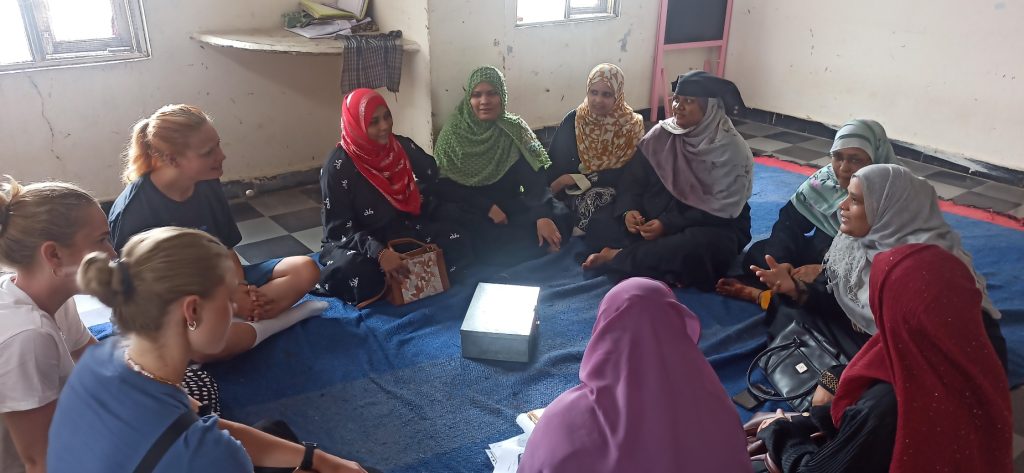
The program came to a close on August 8th, with the students presenting their final projects. The projects dealt with gendered approaches to reproductive health in India; the implications of gender on mental health from the perspective of social determinants of mental health and the intersection between queerness and caste in India. Their projects were nuanced in their exploration of these issues, demonstrating their deep engagement with the material and its evolution through the course.
Finally, a farewell tea was held, with the students, faculty members and staff. The program came to an end with the faculty and staff bidding the students a warm farewell before they departed.
The 2025 SIP Summer Course on “Gender and Society in Contemporary India” has provided an interdisciplinary and immersive educational experience. Through lectures, field visits, and collaborative sessions with faculty and practitioners, students gained a comprehensive understanding of contemporary gender issues and societal dynamics in India. The program reflects the flagship SIP at University of Hyderabad’s commitment to consolidating global academic exchange and promoting critical engagement with issues of gender through both theoretical and practical lenses.

